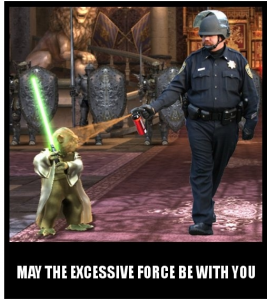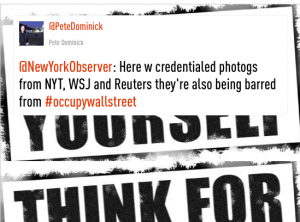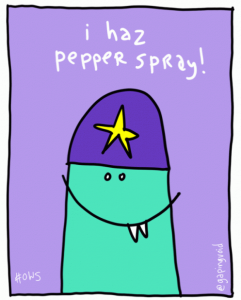By B.L. Ochman
Even more disturbing about Occupy Wall Street than the police’s wanton use of pepper spray against peaceful demonstrators, is the arrest, detainment, and in some cases, physical harm to journalists covering the protests.

The eviction of protesters from Zuccotti Park took place in a media blackout, with credentialed journalists penned in “free speech areas” or arrested for embedding with protesters.
From Gothamist’s coverage of the 1a.m. Zuccotti Park eviction:
“During our coverage of the eviction of the Occupy Wall Street protesters early this morning, a NPR reporter, a New York Times reporter, and a city council member were arrested. Airspace in Lower Manhattan was closed to CBS and NBC news choppers by the NYPD, a New York Post reporter was allegedly put in a “choke hold” by the police, a NBC reporter’s press pass was confiscated and a large group of reporters and protesters were hit with pepper spray. According to the eviction notice, the park was merely “cleaned and restored for its intended use.” If this is the case, why were so few people permitted to view it?
Complacency is dangerous
I’m worried and disturbed at how little these arrests seem to bother most people I’ve spoken to, particularly in an election year. Our free press is what separates us from a police state and those who don’t care will surely pay a price down the line.
Thanks to technology, the whole world learned of the arrests in real time, via social media. Police Commissioner Kelly, who initially defended the arrests, was forced to recant a week later in the face of protests and demands by a coalition of news organizations
 At first, Kelly said of credentialed journalists who were arrested, “I think there was confusion on their part as to just what they are allowed to do. They are private citizens, they were technically trespassers.”
At first, Kelly said of credentialed journalists who were arrested, “I think there was confusion on their part as to just what they are allowed to do. They are private citizens, they were technically trespassers.”
At his press conference about the raid on Tuesday morning, Mayor Michael Bloomberg said journalists were barred from covering the raid “to protect members of the press,” and “to prevent a situation from getting worse.”
Kelly forced to apologize, Bloomberg defends strong arming of media
Less than a week later, The New York Times reported “Police Commissioner Raymond W. Kelly has issued an internal message ordering officers in New York City not to interfere unreasonably with journalists’ access during news media coverage and warning that those who do will be subject to disciplinary action.” The message was read aloud at every police precinct in the city.
Bloomberg, alas, still defends the press blackout. I’ve lost all respect for the Mayor as a result. Sadly, just a couple of years ago, I hoped he’d make a serious bid for the presidency.
Arrests are symptoms of sea change
“These arrests are a symptom of a larger debate about how we understand the First Amendment in a digital age, as the institutions that traditionally embodied those freedoms shift and change,” Josh Stearns of media-reform group Free Press writes on his blog. “As more and more of our speech moves online and over mobile networks, and as our press is distributed across vast human and technological networks, we need to contend with new kinds of First Amendment issues.”
 Occupy Wall St, begun as a gathering of anarchists and hippies, quickly spawned nationwide demonstrations, and gained the support of unions and mainstream liberal groups. Indeed, as protesters pointed out repeatedly, “the whole world is watching” in real-time on computers and mobile devices. They’re not relying on mainstream media for coverage, they’re following it in social media, including Storify, Twitter, Facebook, and blogs.
Occupy Wall St, begun as a gathering of anarchists and hippies, quickly spawned nationwide demonstrations, and gained the support of unions and mainstream liberal groups. Indeed, as protesters pointed out repeatedly, “the whole world is watching” in real-time on computers and mobile devices. They’re not relying on mainstream media for coverage, they’re following it in social media, including Storify, Twitter, Facebook, and blogs.
“Technology has given us a communications toolkit,” he writes, “that allows anyone to become a journalist at little cost… Nothing like this has ever been remotely possible before,” wrote journalist Dan Gillmor in his 2005 book, “We the Media: Grassroots Journalism by the People, for the People”
Citizen Journalists and Buggy Whips
Increasingly over the past dozen years, anyone with a computer, camera, cellphone or tape recorder can report on news, in real-time. This access to audiences has had the same impact on the business model of mainstream media, politics and law enforcement as Henry Ford’s automobile had on the buggy whip industry. Both events proved beyond a shadow of a doubt that old ways of doing things were outmoded and those who couldn’t adapt would die.
Associated Press admonished its reporters for scooping the wire by posting to Twitter in real-time about their arrests. But, as Matthew Ingram pointed out in Gigaom blog, “If Twitter is beating your news wire, you have bigger problems.”
That argument, he writes, is a lot like newspapers which used to publish in print before publishing on their websites out of fear that nobody would need to buy the paper if they read the news first online. That’s a lose-lose approach if ever there was one!
Pepper Spraying Cop becomes a sick joke meme
Mainstream media increasingly finds itself reporting on news generated online, as in the case of the anonymous Tumblr blog “Pepper Spraying Cop” that sprang up and promptly went viral in response to Lt. John Pike’s horrifying pepper spraying of UC Davis students who were passively sitting on the ground, linking arms, to protest tuition hikes.
The paunchy security guard sprayed the students as casually as he might have sprayed cockroaches with poison, and citizen journalists recorded him in photos, videos, and then in a meme, mocking his merciless act by showing him pepper spraying his way through great art and everyday situations.
Regardless of what you may think of the politics involved, it’s hard to deny that the Occupy Wall Street movement has changed the national conversation and forced mainstream media to move coverage from mocking the protests to covering them on page one and embedding their reporters in the protests.
Bill of Rights
Freedom of Speech, Press, Religion and Petition
Congress shall make no law respecting an establishment of religion, or prohibiting the free exercise thereof; or abridging the freedom of speech, or of the press; or the right of the people peaceably to assemble, and to petition the Government for a redress of grievances.
Journalists and observers have been embedded in controversial situations, events, and wars since Biblical times. This is no time to stop that tradition. This is the time to track the news in real time, all the time.
Cartoon: Hugh Macleod, gapingvoid







